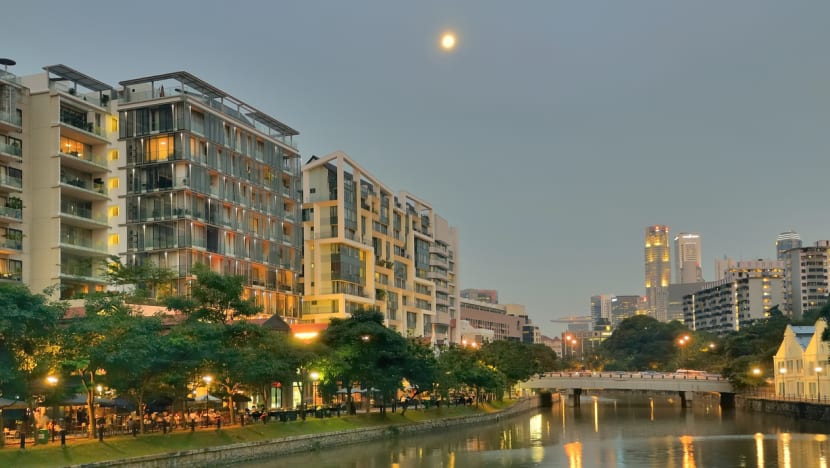Budget 2024: How will changes to property tax impact homeowners and the market?
Home owners can expect to pay the same or lower property taxes with the raising of annual value (AV) bands from January 2025.


This audio is generated by an AI tool.
SINGAPORE: Many owner-occupied properties, especially those in the mid-tier categories, will stand to benefit as property tax is set to go down with the move to raise annual value (AV) bands, said property analysts.
Deputy Prime Minister and Finance Minister Lawrence Wong announced the raising of the AV bands in his Budget 2024 speech on Friday (Feb 16) which would see some home owners paying less property tax.
From Jan 1, 2025, the lowest AV band threshold will be raised from S$8,000 (US$5,900) to S$12,000, while the highest threshold will increase from over S$100,000 to over S$140,000.
Home owners can thus expect to pay the same or lower property taxes at each band, assuming that there is no change in their AVs and before any rebate.
MOST HOME OWNERS, MID-TIER PROPERTIES TO BENEFIT
Property and tax analysts noted that the move to raise AV bands will benefit the majority of home owners and owner-occupied properties.
In the past, most properties had an AV below S$30,000, which meant that home owners only paid 4 per cent property tax, said Christine Sun, senior vice-president of research and analytics from OrangeTee & Tie.
However, with the recent increase in rental prices, many home owners' AVs have crossed the S$30,000 mark, resulting in higher taxes for them.
“This has affected many people, especially those who did not benefit from the rental hike and felt that they were being unfairly penalised,” said Ms Sun.
“Therefore, the changes are considered fair and beneficial for most home owners, especially those who are not landlords.”
Mr Wong had previously announced in Budget 2022 a two-step increase in property tax rates for residential properties, which had been meant as a wealth tax targeted at investment properties and the higher-end segment of owner-occupied private properties.
However, rents increased significantly from 2022 due to a combination of strong demand and COVID-19-related supply constraints, resulting in an increase in annual values as well.
While the government had expected the property tax changes to impact the top 7 per cent of owner-occupied residential properties, the AV increases resulted in nearly 13 per cent of owner-occupied properties being affected.
The announcement on Friday is also to achieve the original top 7 per cent target, “without causing too much pain” for owners of the remaining owner-occupied residential properties, said Mr See Wei Hwa, professional services firm KPMG Singapore’s property tax and dispute resolution partner.
In line with the policy objective of property tax, most owner-occupied residential properties should benefit from the recalibration in the AV bands, noted Mr See.
The notable exception being private properties, such as penthouse and landed bungalows, which have monthly rental value of more than S$11,667 or annual rental value of more than S$140,000, he added.
Chief executive officer of ERA Singapore Marcus Chu pointed out that an Outside Central Region or OCR three-bedroom private apartment with an annual value of S$40,000 can enjoy a property tax saving of S$360.
“This is a 24 per cent reduction compared to 2024,” he added.
Ms Tricia Song, CBRE head of research for Singapore and Southeast Asia said that the revision is expected to benefit owners of mid-tier properties the most.
The difference in property tax payable is more significant for properties with lower AVs, except for properties which have AVs close to the lowest threshold, Ms Song said.
For properties with AVs of S$140,000 and above, the difference in tax payable remains at S$5,760, which is marginal for properties with high AVs.
“Previously, those living in higher value properties who have no or lower income may have considered downgrading.
“With the revised AV bands, coupled with the 24-month interest free installment plan to retirees, owners may be able to pay the property taxes and hold firm to their current property,” Ms Song added.
Mr Wong on Friday also announced that the Inland Revenue Authority of Singapore will offer retirees a 24-month instalment plan without interest to help those living in higher-end residential homes facing cash flow issues.
IMPACT ON PROPERTY MARKET
KPMG Singapore’s Mr See also highlighted that the latest recalibration of the AV band is “not a property market cooling measure”.
“Given that property tax is intended to be a wealth tax, it is not meant to target the population at large.”
The changes to the AV band instead show that the government is “aware of the unintended impact” caused by the surge in rental value, which has resulted in an unexpected increased in property tax collection, he added.
With the 24-month interest free instalment in place, the government remains “steadfast” in achieving the objectives of its wealth tax policy, as property tax remains payable, said Mr See.
Mr Lee Vin Wee, private client services tax leader and partner at Baker Tilly Consultancy Singapore also reiterated that the 2022 property tax increase was intended to subject higher AV owner-occupied private properties to higher property tax.
"While the revised AV bands do provide some respite for such home owners, the property tax savings will only account for a small proportion of the total amount of property tax.
"As such, the revision should not bring about much impact to the property market," said Mr Lee.
This was echoed by real estate platform Mogul.sg’s chief research officer Nicholas Mak, who noted that the announcement will not increase housing demand.
He also pointed out that there is no reduction in the property tax rate for investment properties.
“This property tax adjustment can be deemed to be a small form of (assistance) to fight the rising cost of living for the middle-class home owners.”


















